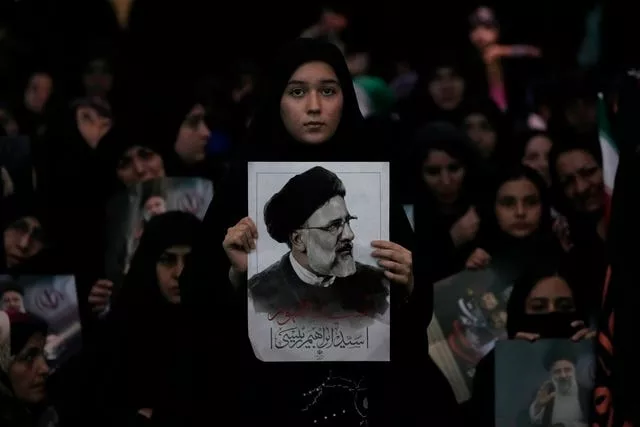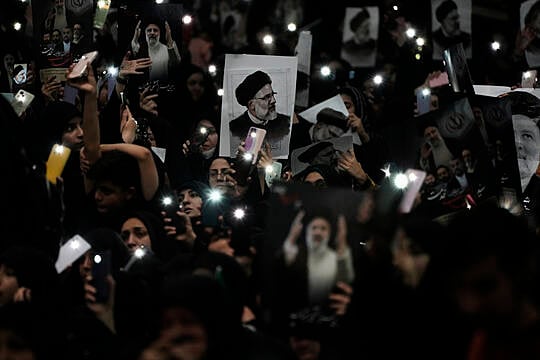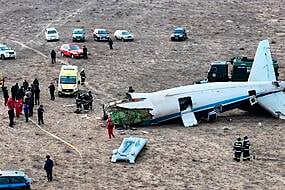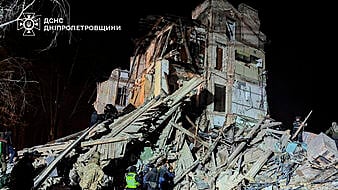Iran’s supreme leader has presided over a funeral for the country’s late president, foreign minister and others killed in a helicopter crash on Sunday, as tens of thousands later followed a procession of their caskets through Tehran.
Ayatollah Ali Khamenei held the service at Tehran University, the caskets of the dead draped in Iranian flags with their pictures on them.
On the late president Ebrahim Raisi’s coffin sat a black turban — signifying him as a direct descendent of Islam’s Prophet Muhammad.

“Oh Allah, we didn’t see anything but good from him,” Mr Khamenei said in the standard prayer for the dead in Arabic.
He soon left and the crowd inside rushed to the front, reaching out to touch the coffins.
Iran’s acting president, Mohammad Mokhber, stood nearby and openly wept during the service.
People then carried the coffins out on their shoulders, with chants outside of “Death to America!”
They loaded them onto a semitruck trailer for a procession through downtown Tehran to Azadi, or “Freedom,” Square, where Mr Raisi gave speeches in the past.
In attendance were top leaders of Iran’s paramilitary Revolutionary Guard, one of the country’s major power centres.

Also on hand was Ismail Haniyeh of Hamas, the militant group that Iran has armed and supported during the ongoing Israel-Hamas war raging in Gaza. Before the funeral, Mr Haniyeh spoke and an emcee led the crowd in the chant: “Death to Israel!”
“I come in the name of the Palestinian people, in the name of the resistance factions of Gaza… to express our condolences,” Mr Haniyeh told those gathered.
He also recounted meeting Mr Raisi in Tehran during Ramadan, the holy Muslim fasting month, and heard the president say the Palestinian issue remains the key one of the Muslim world.
The Muslim world “must fulfil their obligations to the Palestinians to liberate their land,” Mr Haniyeh said, recounting Mr Raisi’s words.
He also described Mr Raisi calling the October 7th attack that sparked the war, which saw 1,200 people killed and 250 others taken hostage, an “earthquake in the heart of the Zionist entity”.
The war has since seen 35,000 Palestinians killed in the Gaza Strip and hundreds of others in the West Bank in Israeli operations.

Mr Raisi (63) had been discussed as a possible successor for Iran’s supreme leader, the 85-year-old Mr Khamenei.
The only other person suggested was Mr Khamenei’s 55-year-old son, Mr Mojtaba.
However, concerns have been raised over the position going to a family member, particularly after the revolution overthrew the hereditary Pahlavi monarchy of the shah.
Meanwhile, an Iranian official offered a new accounting of Sunday’s crash, further fuelling the theory bad weather led to it.
Gholamhossein Esmaili, who travelled in one of the two other helicopters in Mr Raisi’s entourage, told state TV that weather had been fine when the aircraft took off.
But Mr Raisi’s helicopter disappeared into heavy clouds and the others could not reach the aircraft by radio, forcing them to land at a nearby copper mine.
Neither Mr Amirabdollahian nor a bodyguard on board responded to calls, but Tabriz Friday prayer leader Mohammad Ali Ale-Hashem somehow answered two mobile phone calls, Mr Esmaili said.
It was not clear why Iran then could not track the phone’s signal.
“When we found the location of the accident, the conditions of the bodies indicated that Ayatollah Raisi and other companions had died instantly but Ale-Hashem… (died) after several hours,” he said.







